While most Knox College students were wrapping up their spring term finals and preparing to move out, now fifth-year J. Porter was unexpectedly packing up the historic WVKC station. As the General Manager for Knox’s radio station, 90.7 WVKC ‘The Voice of Knox College,’ Porter received an email that would change WVKC forever: the WVKC recording booth would be replaced by the George Davis Hall elevator shaft and they had less than a week to preserve everything inside of the studio.
Located on the fourth floor of GDH, the WVKC studio has always been difficult for students to access due to the four flights of steep steps up to the station. The GDH elevator has been long awaited by WVKC GMs of the past, who knew that the station was not accessible and wanted that to change.
“This is really cool that it’s happening. I’m genuinely really excited. It’s just the fact that we learned two days before everyone had to leave that’s the problem,” Porter said.
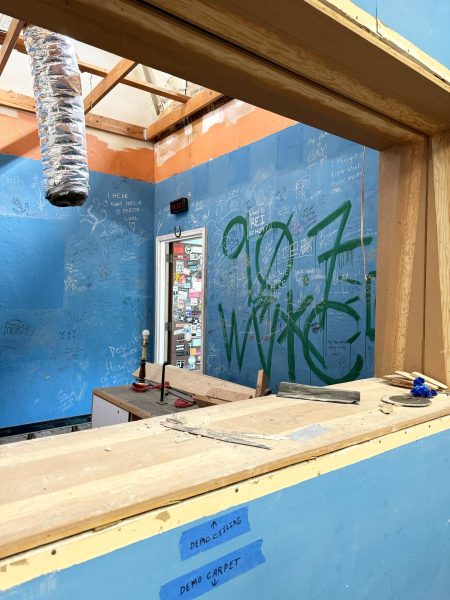 The current WVKC studio was built in GDH by students in the 1980s, and even then there were rumors of a GDH elevator. While the administration declined to indicate whether they were aware of it being student-built, they said that their decision was dictated by existing utilities, structural components, and roof clearance.
The current WVKC studio was built in GDH by students in the 1980s, and even then there were rumors of a GDH elevator. While the administration declined to indicate whether they were aware of it being student-built, they said that their decision was dictated by existing utilities, structural components, and roof clearance.
“All throughout the time I’ve been at school there’s been rumors of an elevator going into GDH. It happened every single year, once again it also happened last year and we were having our final meeting of the term, and Lincoln, our Studio Director, was like, ‘hey I heard the rumor about the GDH elevator we should probably contact someone about that to make sure it won’t interrupt our stuff,’,” Porter said. “I wasn’t certain it was gonna happen and I was like ‘well they probably would’ve told us if it would mess our s–t up’. But without Lincoln bringing that up we would be in a much worse spot. I sent an email to Pat Pendergast basically, ‘yes or no will the construction this summer mess our studio up?’ and I got the response which is almost the worst thing of being like, ‘let’s talk about this’.”
During Porter’s meeting with Manager of Campus Operations and Maintenance Pat Pendergast and a Senior Architect of the company that is building the elevator, they shared the elevator plans with Porter, believing that WVKC staff were already aware of the changes that would be made to the studio as a result of the elevator construction.
“They were like, ‘yeah, so as you know this whole area is being taken out this is where the elevator will be’… The elevator will be basically immediately where our current recording booth is and then going way into the back rooms and our hang out area. We will probably have two-thirds of what it was,” Porter said.
Despite the initial meeting and Porter’s request for frequent updates, the updated plans for the studio have not been shared with them, and as of right now they are unaware of the full scope of the changes. While administration said in a statement to TKS that there will only be a “small reduction in space,” Porter has been told that the shaft has taken up more space than intended.
“The thing is if I didn’t reach out and bring it up and we didn’t meet with people and I wasn’t diligent about it, they would’ve probably just thought we’re really lazy and didn’t want to move anything but no one told us anything. I talked to campus life like Aryn and Jake McLean and they didn’t know anything about it either,” Porter said. “This is miscommunication from like literally every angle, it’s– it’s literally insane how this happened.”
Vice President for Administration and General Counsel Bradley Nolden, said in the statement, “Communications with all partners and areas impacted by the GDH project could have been better, and we will work more closely with all stakeholders through the completion of the project,” but provided no further details of the miscommunication.
Despite addressing the previous miscommunication, Porter has not been consistently updated about the construction progress. 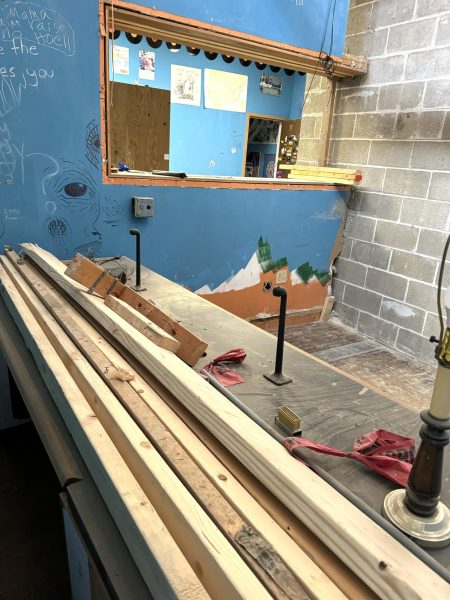
“It’s made things harder, we don’t know where anything is. I wasn’t categorizing or inventorying anything but it was very much just a rush to get things hopefully preserved and I haven’t really gotten too much information about how that process is going. I know that the shaft has been built and now it’s just about installing the actual elevator,” Porter said.
Pendergast was unable to provide an updated plan for the space showing what will or will not still be part of the WVKC studio, as the college is still unsure of what the new studio floor plan will be. What is clear is that the current recording booth will be essentially replaced by the elevator shaft, and the open ‘hang-out’ space will be significantly reduced due to the new recording booth being in the middle of that open space.
Porter believes the lack of communication between administration and WVKC staff often comes from a fundamental misunderstanding of the nature of student-run organizations. Although media organizations like WVKC have a faculty advisor, they create and process media on their own, receiving only organizational support from advisors.
“One of the reasons that there’s a bunch of miscommunication is because the admin of =Knox doesn’t realize how solely student-run WVKC is. I’ve learned this a lot over emails over the summer,” Porter said.
Previously, Knox had a station facility manager position that handled all aspects of the studio not covered by Tri States Public Radio, which has provided all of the equipment needed for WVKC broadcasting since 2013. This position was created because the WVKC advisor, professor of theatre Craig Choma, pointed out to the college administration that managing a college facility should not be the responsibility of the students running the station, which the administration agreed with.
However, the station has been without a facility manager since the last one was let go several years ago.
“It’s just general managers teaching their staff and then, you know, it keeps cycling out and that’s how it’s always – or at least recently, that’s how WVKC has existed. There’s no real admin oversight, which is kind of cool but it also is weird because when admin decided this was happening the only people they told was Tri-State radio,” Porter said. “But Tri-states isn’t affiliated with Knox so they didn’t tell us and Knox for some reason didn’t… No one actually thinks student orgs are run by students, like they just didn’t bother to tell us. I don’t know their part of the story, I haven’t really talked to anyone but that’s how it seems to me, not to make that an oversimplification but that’s how it comes off to me as a student organizer is that it just doesn’t seem like there’s a lot of either trust or understanding that students really do run all of the orgs.”
According to Porter, TSPR has agreed to build up the technical aspects of the station when it opens again. Porter said much of the broadcasting equipment that WVKC uses and keeps in the station is from and maintained by them. While TSPR was told that the project was happening, according to an email that WVKC shared with TKS, they were given no notice as to when it would begin and were given only a week’s notice to retrieve their equipment. A deadline which, like WVKC’s, functionally could not be met.
Porter spent a large amount of time moving things to meet the deadline, with only two graduating staff members on campus to help. Along with Kevin Cox ‘24, Isabelle Etheridge ‘24, and senior Jonas Dodge, they moved everything they could.
“What I ended up doing my senior week is I spent most of my time up there moving boxes of vinyl and like our guitars and drum set and if you’ve been in the radio station you know there’s a lot of memorabilia and stuff on the walls and like past concert things,” Porter said. “It was really the worst of all situations because all my graduating friends who were still around were busy, you know, graduating and everyone else like literally left two days after we learned so I was kind of the only one who could do a lot of stuff – this isn’t, ‘woe is porter having to do stuff alone.’ It’s bigger than that.”

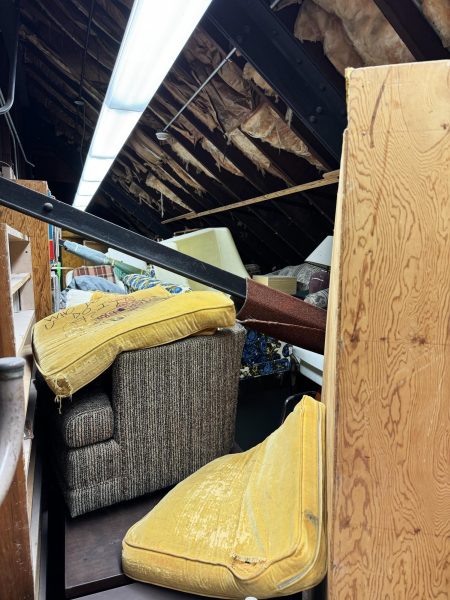
There were only two small places in the studio where the construction would, “probably be able to not destroy our stuff,” Porter said. All of the supplies and records that they were able to preserve had to be crammed into those spaces. Everything that wasn’t able to be moved was meticulously labeled.
In addition to this labeling, Porter crafted a 10-page letter to the people doing the construction detailing what needs to be saved and what things need to be kept out. Porter is still currently unaware and has not been updated about the location or state of these items.
One important item that needs to be saved is a plaque from the recording booth. This booth, now an elevator shaft, was a memorial to a radio station alum. Administration declined to share whether or not they were aware of this memorial space or if it was considered during the planning process.
“There was a Knox alum who passed away I think in 2008 and in the recording booth there’s a giant plaque on the wall dedicated to Spencer. It’s nailed in and I couldn’t take it off but I made it super, super clear in the doc, ‘do not get rid of this, this is really important’ and I honestly have no clue what happened to it they could’ve just thrown it out or destroyed it for all I know,” Porter said.
Porter said there’s a lot of student history connected to the WVKC station, which made it more difficult to preserve things. Students from many generations had drawn onto the walls of the station, which were not able to be preserved. To document these unpreservable memories, the staff made a video doing a walking tour of the station. This is currently the last piece of media that they have of the station as it was.
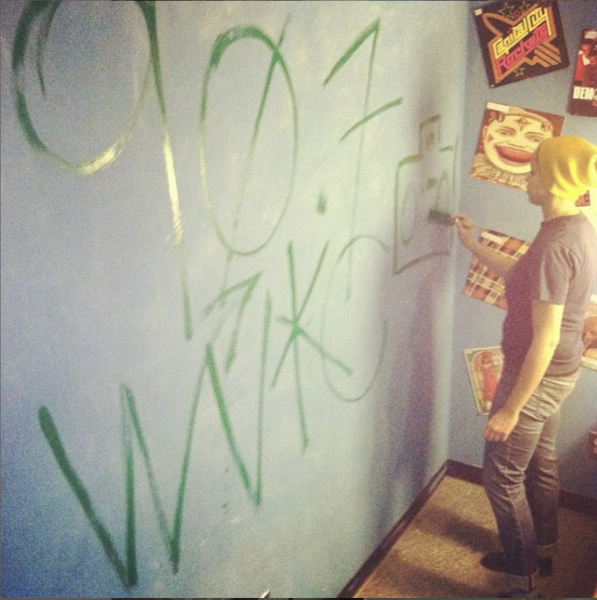
“The thing that breaks my heart the most about it is we sent out an email basically a couple days after we learned at the start of senior week being like ‘here’s what’s going on, we’re kind of freaking out – godspeed’ and we got a response from this alum who worked at the radio station in the 90s. He was on campus because his kid is a first-year here this year and he was basically saying, ‘if i knew this was happening earlier,’ – because he’s still really close to the people he worked in the radio station with – ‘me and my buddies would’ve come and helped you guys out’,” Porter said. “And that’s the thing that hurts me the most because there’s no closure for anyone, especially for alumni. Especially in the 90s because the radio station’s cool now, but it was the biggest method of communication before a lot of modern technology so there’s just no closure for anyone who really loved and had an identity in the station.”
WVKC is celebrating its centennial this year, and were planning to invite alumni back to visit the station prior to learning about the construction. Porter was originally told that they would have access to the studio during spring term 2025, however they say they wouldn’t be surprised if it gets postponed due to the slow process and lack of communication. Despite the issues that Porter has faced during this process, their main focus is the broader community that WVKC has been meaningful to.
“A common theme throughout this entire story is just that a lot of admin and like campus life – and this is no shade to like any particular person like this is not a hate Knox thing – but it’s just a theme that people tell us that they hear us and they can get things done for us and then there’s no response. Which is whatever, its par for the course for Knox, I’m not really upset about it,” Porter said. “Honestly I more care about broadcasting because some alumni and professors have reached out to me kind of upset that we don’t have it right now especially for homecoming. A lot of alumni want access to broadcasting which is something that I can’t do on my own and if Knox doesn’t step in and do something we’re just not gonna have it.”
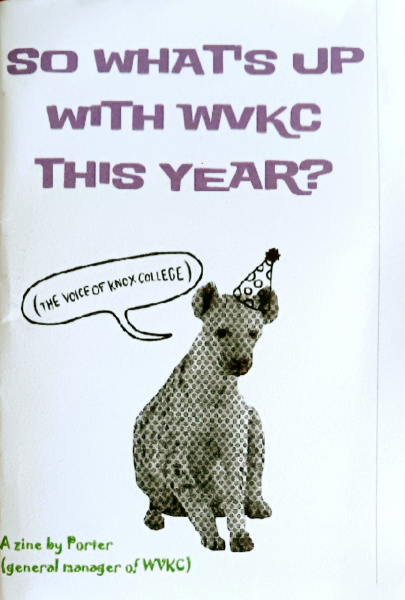
Attempts have been made by Porter to find a new space to broadcast from. Within the last few years WVKC moved to internet broadcasting, which requires much less equipment than being on the traditional radio waves. This would allow a space for broadcasting to be relatively easy to set up, however, Porter is unaware of a space being found.
In the meantime, Porter is fulfilling their long time idea of connecting zine making and WVKC. Now that WVKC is unable to broadcast this year, Porter has turned to zine making as an alternative way to give Knox students a voice.
Zine making is a form of visual art and communication that doesn’t require a specific art skill set. Zines, short for magazine, are self published unique works that can include a variety of topics. One common design includes only one sheet of paper and a little bit of folding and cutting to make a mini eight page booklet.
“I’ve been really involved with zine making for WVKC because the roots are very punk and the idea is this is a way to publish when no one will publish you. And this is like extremely overdramatic I wanna like put that on the record that you know, WVKC not having a place to broadcast is not life or death as a student org at the end of the day, but that being said, us not having a way to broadcast very suddenly is a silencing technique,” Porter said. “Most of our shows are very silly and very improv based in the recent years and that’s been very fun but still, it’s a way that people used to be able to say something into the public unrestricted and it’s just been very suddenly taken away so I thought the connection between that and zines was very salient; that it is a way to have your voices heard when your typical way of doing that is shut off.”
In the face of lack of a storage space for the zines, Porter intends to set up a zine library where students can submit zines to be added and request copies of their zine to be made. These will then be available to the public to take copies and share.
“We’re interested in keeping a library. We have kind of a bigger budget compared to a lot of clubs because we’re a media org. I’m really interested in if someone submits to us they can request any number of printed color copies and we can give it to them just in exchange of them contributing to the library,” Porter said.
Overall, Porter is less interested in finding out why the miscommunication happened and is focusing on trying to deal with the consequences.
“WVKC is trying to kind of balance this idea of having immense frustration along with not just going after people. Because here’s the thing, even though this all went horribly, no one was intentionally like, ‘we’re gonna make life harder for the students’. So going forward, I’ve very much reiterated this to my staff, like we’re not interested like being like here is the one problem person in charge, you know, boycott … because it comes down to unprofessionalism is honestly the culprit, and just a lack of care,” Porter said.
However, Porter also has recognized the efforts of student life, along with manual labor and Choma, to resolve this issue.
“The Knox people we’ve been talking to…they’ve all honestly been really coming to bat for us because something really f—d up happened and a lot of them have been stepping in,” Porter said. “Things have been really slow, promises have been made to us that haven’t been delivered but that being said people have really come out for us which has been really nice.”
This new zine project has sparked more enthusiasm among the WVKC staff than the station’s usual operations have. Porter feels that in the past few years WVKC has become mostly focused on the big events, rather than its original mission of being a media organization that emphasizes student voices.
“This is kind of a chance for WVKC to renew itself. From just, we have our big concert once a term, to much more of getting student voices heard which I think we should be more known for,” Porter said.

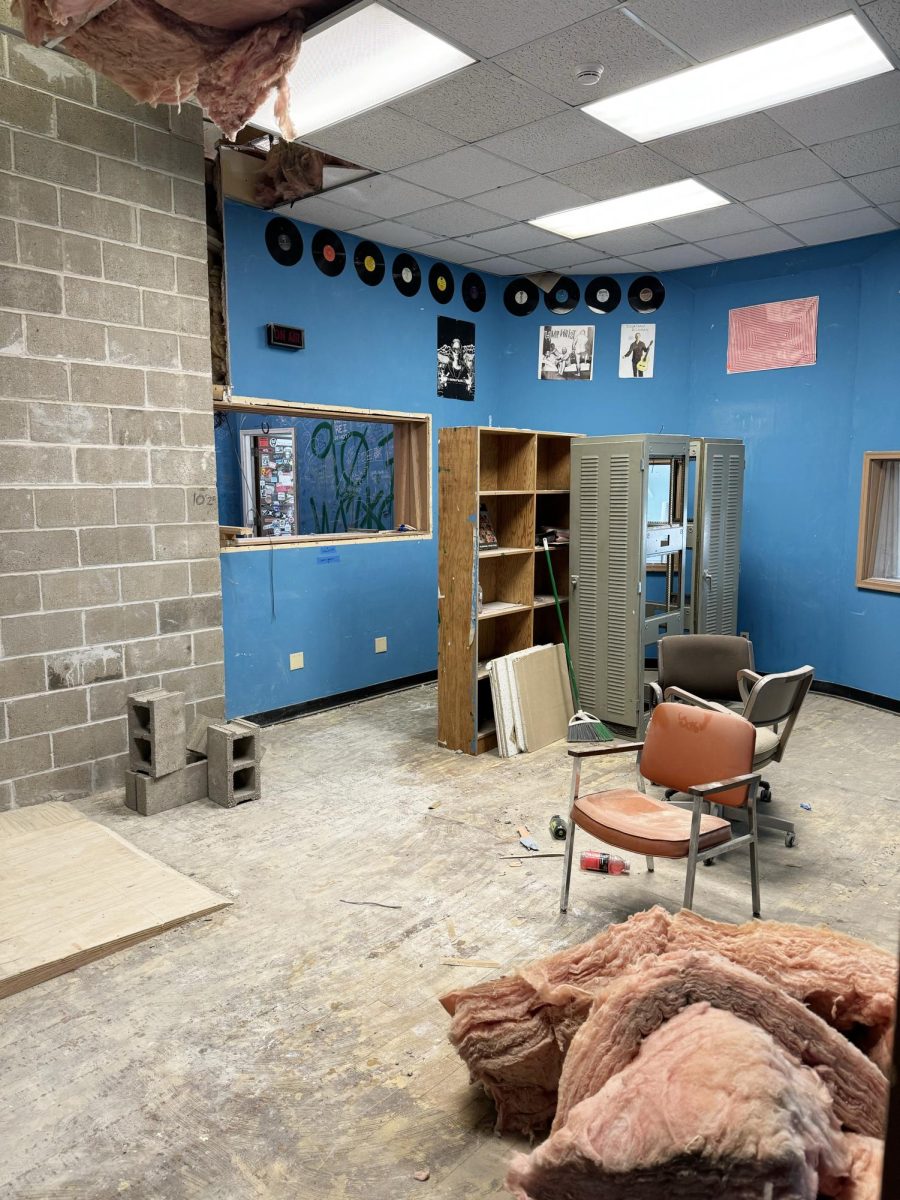
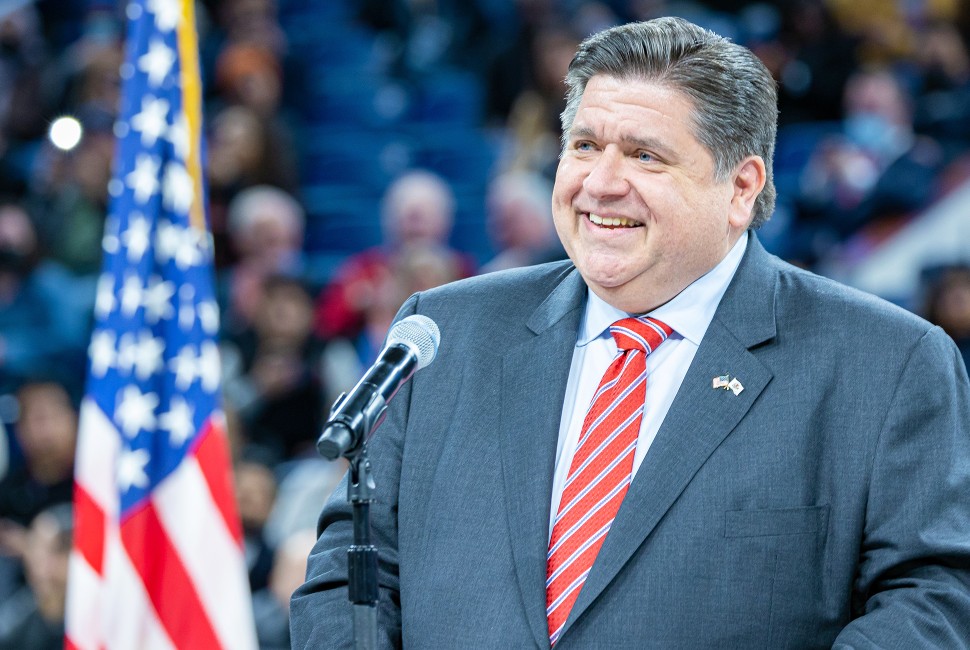
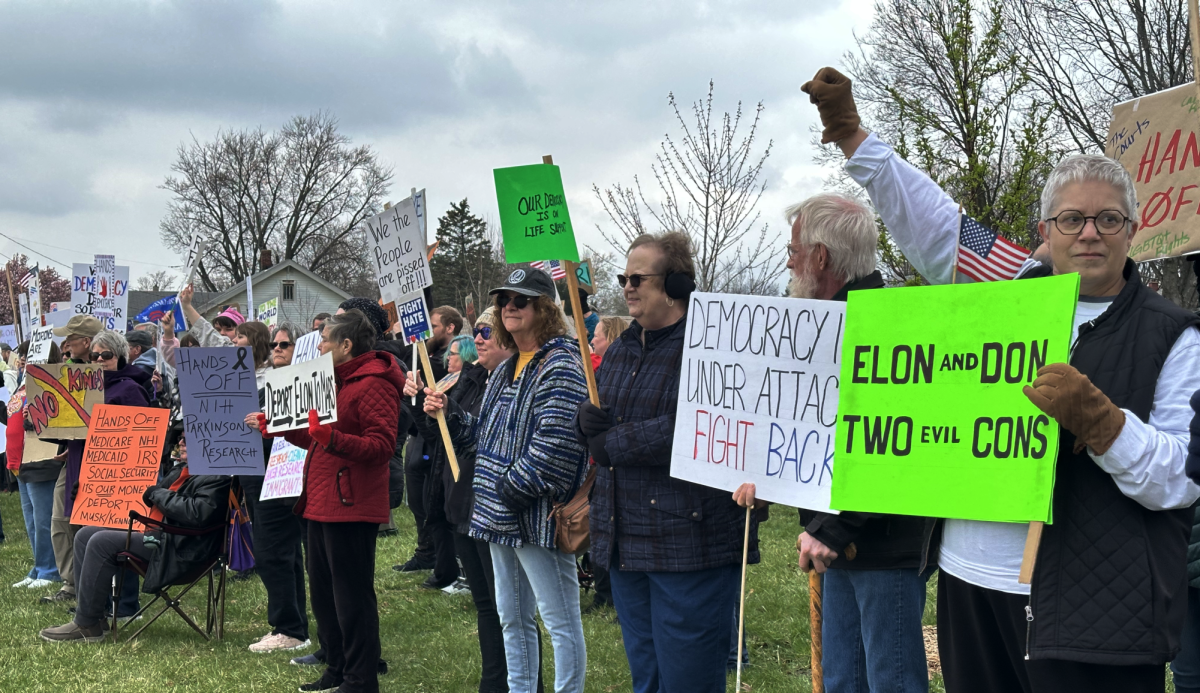
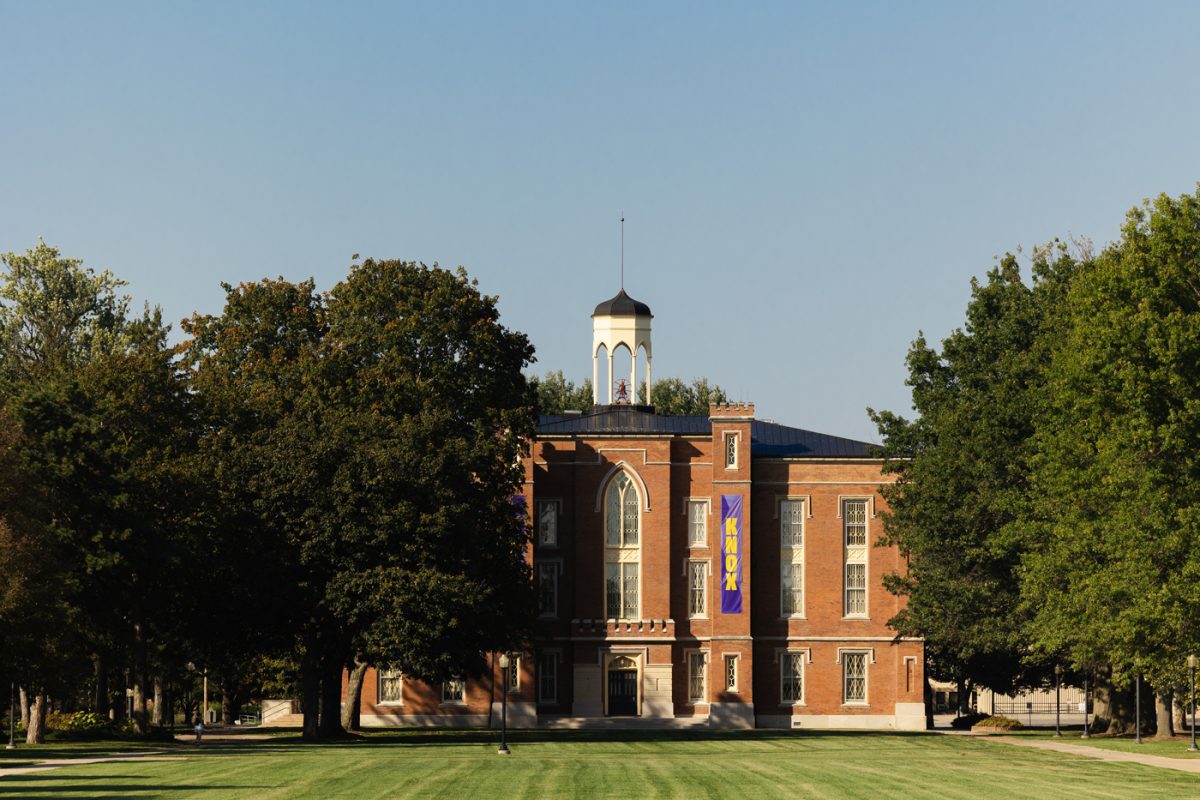
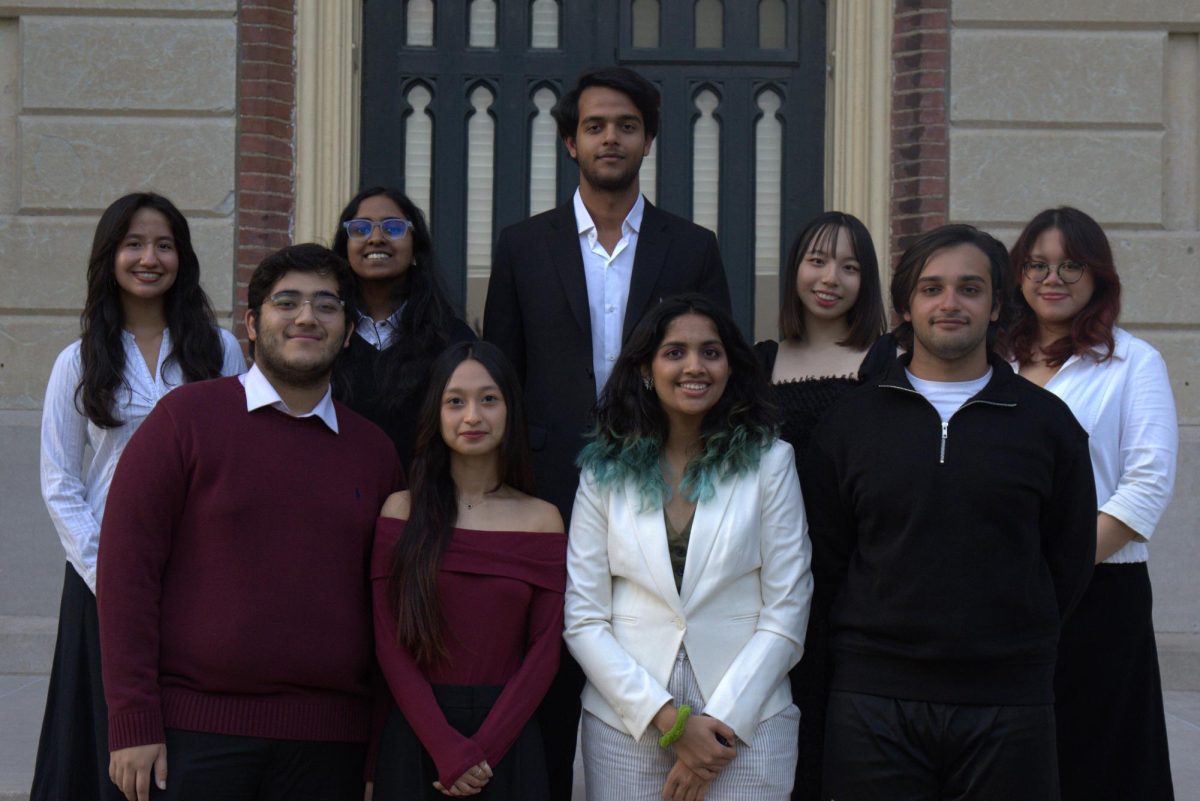
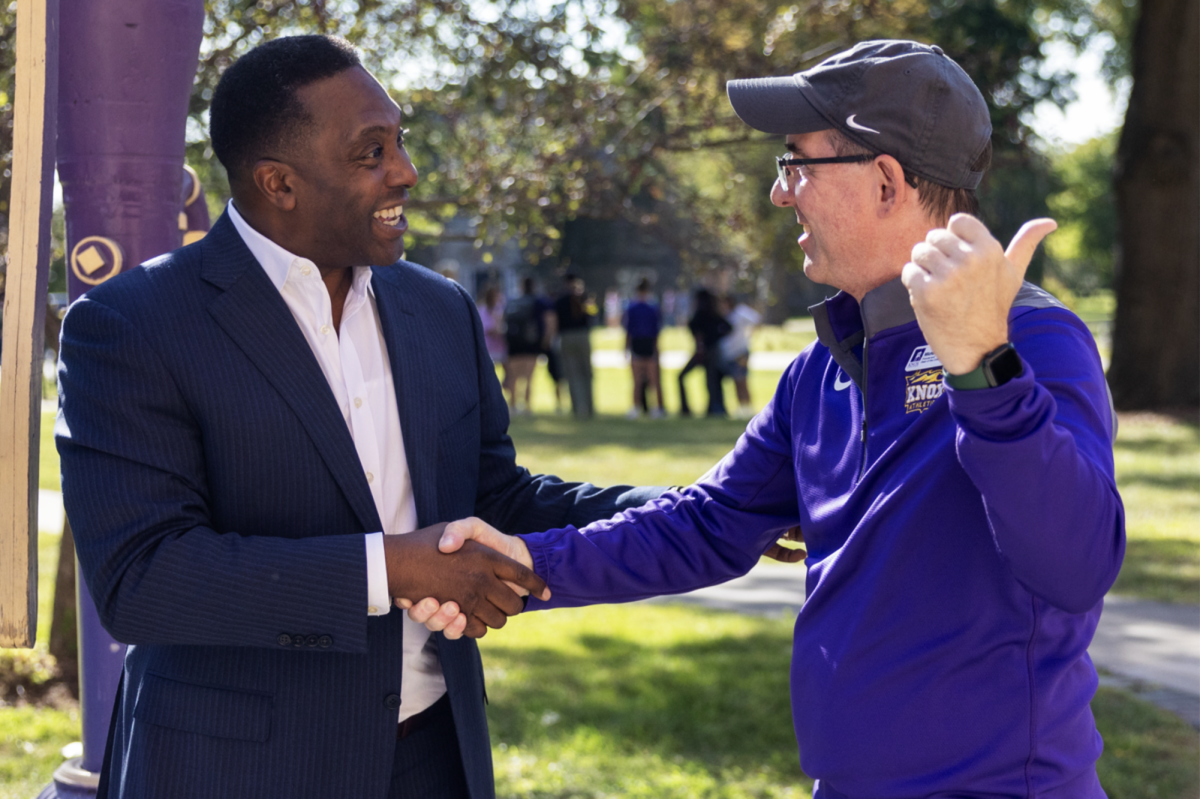
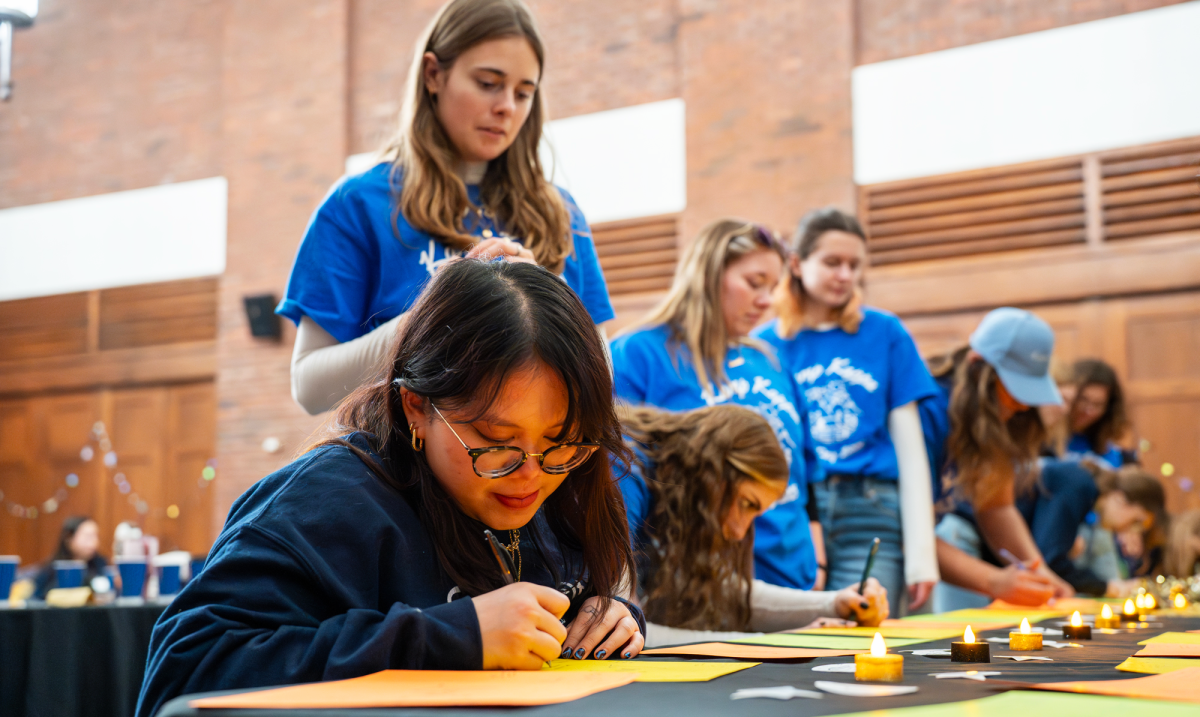
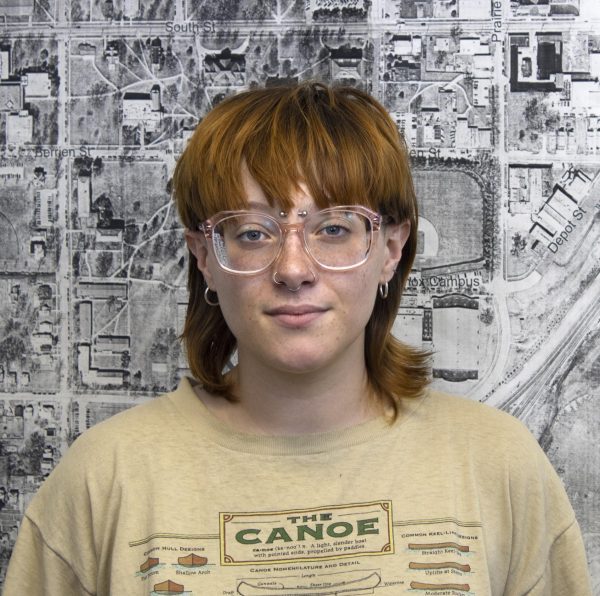
Kevin • Nov 5, 2024 at 3:58 pm
Crazy how much stress was cauaed out of nowhere. But I also know Porter is absolutely eating up that zine project. Can’t wait to see what happens. I love WVKC and everyone in it. CHELLEN THIS WAS SUCH A GOOD ARTICLE.
Eleanor Lindenmayer • Nov 3, 2024 at 7:48 am
bro that’s so wild. excellently reported as always, but you don’t need me to tell you that. <3
Ellen • Nov 3, 2024 at 11:56 am
ILY I MISS YOU BAE
Porter • Nov 2, 2024 at 7:45 am
Update since this interview!! Knox is buying us new furniture and Bradley and Pat have been really cool with keeping me in the loop on things. Most of the murals are walls are actually still intact, and the broadcasting booth will still be in the same place (just a little smaller)!
ellen • Nov 3, 2024 at 11:57 am
i hope it’s not fugly dorm furniture